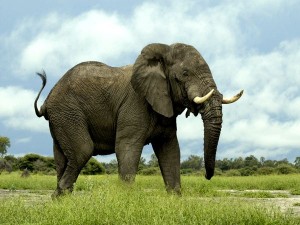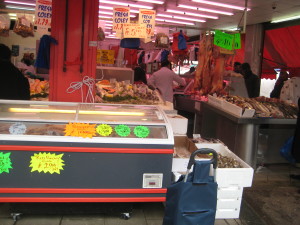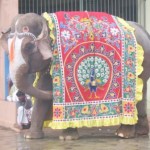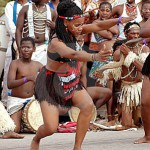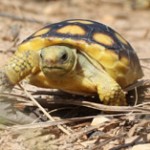
Ìjàpá ọkọ Yáníbo – Tortoise the husband of Yanibo

Gbogbo Ẹranko – Group of Animals
Gbogbo Ẹranko (Ajá, Àmọ̀tẹ́kùn, Ẹkùn, Kìnìún, Ọ̀bọ, Akátá, Ológbò, Kẹ́tẹ́kẹ́tẹ́, Ìjàpá/Àjàpá àti bẹ̃bẹ lọ) kó ara jọ lati gbèrò lórí àlébù tí wọ́n rí lára ìyàwó wọn. Ajá ní ìyawó òhun nṣe àgbèrè, Ẹkùn ní ìyàwó òhun nṣe àfojúdi, Ológbò ní ìyàwó òhun njale, Ọ̀bọ ní ìyàwó òhun lèjàjù àti bẹ̃bẹ lọ. Àwọn Ẹranko yókù ṣe àkíyèsí wípé,
Àjàpá/Ìjàpá kàn mi orí ni lai sọ nkankan ju un!
Kìnìún wa bèrè lọ́wọ́ Ìjàpá wípé ṣe Yáníbo (ìyàwó Ìjàpá) kòní àlébù ni? Àjàpá/Ìjàpá dìde ó wá fọhùn wípé gbogbo àlébù ti gbogbo wọn sọ nípa ìyàwó wọn kéré lára ti ìyàwó ohun nítorí “Yáníbo kò ní ìtìjú”. Ẹni ti kó ni ìtìjú a jalè, a purọ́, a ṣe àgbèrè, a ṣe àfojúdi àti bẹ̃bẹ lọ.
Ni Ìlúọba, bi Òṣèlú bá ṣe ohun ìtìjú bi: àgbèrè, jalè, gba àbẹ̀tẹ́lẹ̀, bi wọn bá ka mọ tàbí kó rò wípé aṣírí fẹ́ tú, á gbé ìwé sílẹ̀ pé òhun kò ṣe mọ nítorí ki ipò òhun má ba di ìdájọ́ lọ́wọ́, ṣùgbọ́n apàniyàn, olè, alágbèrè àti bẹ̃bẹ lọ., pọ nínú Òṣèlú Nigeria nítorí wọn kò ni ìtìjú. Ipò Òṣèlú tiwọn fún wọn láyè lati ni àlébù àti lati tẹ ìdájọ́ mọ́lẹ̀.
Ọ̀rọ̀ Yorùbá tó ni “Àìnítìjú lọba gbogbo Àlébù” gba èrò lati ri wípé ará ìlú dìbò fún Afínjú Òṣèlú kí wọ́n lè ṣe àtúnṣe nkan tí aláìnítìjú Òṣèlú ti bàjẹ́.
ENGLISH TRANSLATION
All the animals (Dog, Panther, Leopard, Lion, Monkey, Jackal, Cat, Donkey/Ass, Tortoise etc.) gathered together to discuss the vices they noticed in their wives. Dog’s wife was said to be committing adultery, Leopard’s wife was insolent, Cat’s wife was stealing, while Monkey’s wife was quarrelsome etc.
All the animals noticed that there was no comment from the Tortoise other than nodding and sighing. The Lion then asked what Yanibo (Tortoise’s wife) vice was? The Tortoise rose up and said to the other animals that all the vices they have mentioned could not be compared with his wife’s only vice because “Yanibo has no shame”.
In the United Kingdom, when a Politician commits any act of shame like adultery, stealing, taking bribe, on or before he/she is caught would resign in order not to perverse the cause of justice but killers, thieves, adulterers etc. are common among the Nigerian Politicians because they have no shame. They use their position to perverse the cause of justice.
This Yoruba Folklore that depicted that “Shamelessness is the king of all Vices” is worthy of note for the people to be mindful of the kind of Politician by casting their votes to elect “Decent” Politicians to repair what the” Shameless” ones has destroyed.
Originally posted 2014-05-13 10:15:03. Republished by Blog Post Promoter


